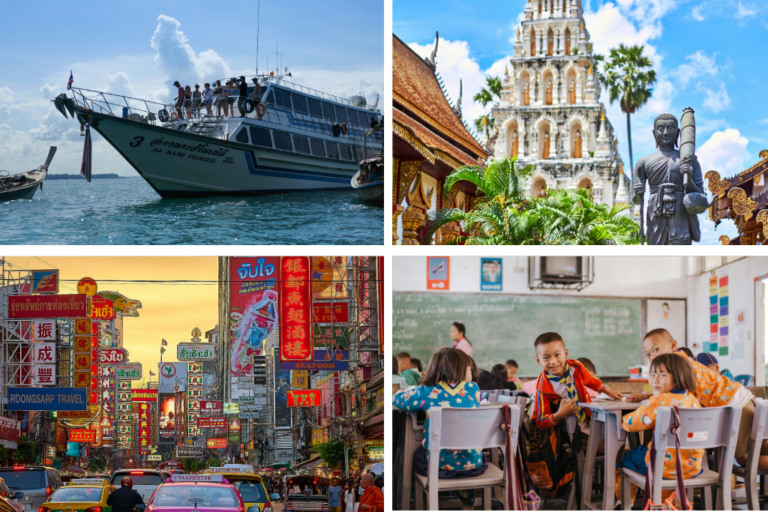How to work in Thailand: Opportunities and requirements
Discover how to work in Thailand: requirements, visas, job opportunities, and cost of living for foreigners.
Many people dream of the chance to work in Thailand with its stunning beaches, vibrant culture, delicious food, and a more relaxed lifestyle compared to much of the West. But before you make the move, it is important to know the reality. Not every job is open to foreigners, and there are clear rules about what kind of work is allowed, the permits required, and how to navigate the local job market. Still, Thailand offers rewarding opportunities for foreigners in fields like language teaching, tourism, technology, and international business.
In this article, we will show you the benefits, the requirements you need to meet, and the real opportunities available for people looking to build a career in this Southeast Asian destination.
Advantages of working in Thailand
Working in Thailand means having the chance to grow professionally in a multicultural environment. From the warmth of its people to the balance between work and personal life, this destination offers a combination of career opportunities and an appealing quality of life for those looking to take the leap abroad.
- Economic stability: Thailand has one of the strongest economies in Southeast Asia, although it relies heavily on tourism and exports, which makes it vulnerable to global crises. The currency, the Thai baht, is relatively stable, and the low cost of living helps offset salaries, especially compared to Western countries. For foreigners, job stability largely depends on the type of visa and contract, as not all sectors allow the employment of non-locals.
- Competitive salaries: Foreigners in Thailand usually find the best-paying jobs in fields where local talent is limited, such as language teaching, international management, technology, and executive roles. Jobs in tourism and hospitality tend to offer lower salaries, but specialized positions, particularly in tech or global companies, often include perks like private health insurance, help with visas, and even assistance with housing.
- Quality of life and work-life balance: Thailand offers quality healthcare, especially in private facilities, excellent food, and a generally safe environment in most cities, all of which make for a comfortable lifestyle. Compared to other Asian countries, work pressure is often lower and schedules more flexible, leaving more time to enjoy leisure activities.
- Affordable cost of living: Although Bangkok is more expensive than other cities, living in Thailand is generally much more affordable than in Europe or the Americas. Housing, transportation, and food all come at reasonable prices.
- Welcoming culture and multicultural environment: Thai people are generally friendly and welcoming. In cities like Bangkok, Chiang Mai, and Phuket, international communities make it easier to settle in. Thailand is also a great hub for exploring Southeast Asia, with affordable flights to destinations such as Vietnam, Malaysia, Singapore, and Cambodia.
- Good climate and relaxed lifestyle: The tropical climate, along with easy access to beaches, mountains, and natural areas, makes Thailand an ideal setting for those looking to balance work and well-being.
Requirements for working in Thailand
If you are thinking about working in Thailand, it is important to be aware that the country has strict rules for hiring foreigners. You cannot just show up and start looking for a job. Meeting the legal requirements to live and work there is essential, and knowing them ahead of time will help you enjoy a stable and secure work experience.

- Work Visa (Non-Immigrant Visa “B”) allows foreigners to enter Thailand for work or business purposes. It is the essential first step to legally working in the country, since it allows you to apply for a work permit afterward. You must obtain it before entering Thailand by presenting a job offer or contract from a Thai company.
- Work permit: Once you are in Thailand, your employer must handle the process so you can work legally. Without this document, even if you have a visa, you are not allowed to work.
- Valid job offer: The company that hires you must explain why they need a foreign employee and follow the regulations for hiring non-locals.
- Academic or experience requirements: In most cases, employers will require a university degree and/or verifiable experience in the field.
- Personal documentation: A valid passport, photos, a criminal background check, and in some cases, proof of financial means.
Tips for starting work in Thailand
Working in Thailand can be an amazing experience, as long as you arrive prepared, have realistic expectations, and are ready to adapt to the local culture and regulations.
- Have internet access from day one: One of the first challenges when arriving in Thailand is having internet access from day one. Relying solely on hotel, café, or airport WiFi can be inconvenient and insecure. That’s why many travelers and foreign workers prefer to have it sorted before they even land. One of the most convenient options is Holafly, which offers eSIMs with unlimited data that activate as soon as you arrive, so there’s no need to hunt for a physical SIM card or waste time on paperwork.
- Don’t arrive without a work plan: It might seem tempting, but finding a job in Thailand is not as simple as just showing up. Most employers expect you to secure a job offer before you can apply for a visa and work permit.
- Health insurance: Not always mandatory, but highly recommended. Many companies offer it as part of the contract.
- Find out about restricted jobs: Thailand reserves many professions for its citizens, such as drivers, hairdressers, or street vendors. As a foreigner, it is better to focus on areas where there is demand, like language teaching, tourism, technology, or international business.
- Learn the Thai language: It helps a lot. While English is commonly used in Bangkok and in business settings, knowing some basic Thai phrases can open doors and shows respect for the local culture.
- Be aware of immigration bureaucracy: If you have a long-term contract, you will need to report your residence every 90 days and renew your visa as required. It can be tedious, but it is mandatory.
- Adapt to the local working style: The work pace in Thailand is generally less stressful than in other Asian countries. Hierarchy plays an important role, and showing respect to supervisors is a key part of the work culture.
Types of jobs in Thailand for foreigners
While many professions in Thailand are reserved for locals, foreigners can still find promising opportunities in areas that require language skills, international experience, or specialized expertise. Jobs may be limited, but in certain sectors the demand is strong and ongoing.
- Language teaching: English is in the highest demand, though there is also a need for other languages such as Chinese, Japanese, or Spanish. Foreign teachers can work in schools, universities, private academies, or as tutors.
- Tourism and hospitality: Jobs in hotels, travel agencies, resorts, or cruise ships, focused on serving international customers.
- Technology and startups: Software development, digital marketing, e-commerce, and roles in tech startups in Bangkok and Chiang Mai.
- International business and trade: Import and export companies, logistics firms, and consulting businesses. Positions that involve working with international clients or suppliers.
- Service centers and multinationals: Bangkok is home to the regional offices of global companies that hire expats for roles in finance, human resources, and international customer service.
- Freelance and remote work: Although the law does not allow tourists to work, many foreigners in Thailand work online for companies abroad while living in the country. To do this legally, the proper visa and permits are required.
The most in-demand jobs in Thailand for foreigners
Thailand has a dynamic economy that relies heavily on tourism, education, and increasingly on technology. Employers highly value and actively seek foreigners in certain areas. These opportunities usually favor people who have skills that locals may lack, such as language proficiency, international experience, or specialized technical expertise.

- Foreign language teachers: Especially English teachers, but there is also demand for other languages such as Chinese, Japanese, German, and Spanish.
- Tourism and hospitality specialists: Positions in hotels, resorts, travel agencies, and tourism management, focused on international clients.
- Technology professionals: For roles such as software development, digital marketing, e-commerce, artificial intelligence, and cybersecurity.
- International executives and managers: Multinational and international trade companies look for expats to fill roles in sales, import and export, and project management.
- Business and finance experts: Consultants, accountants with international experience, and investment specialists who bring a global perspective.
- Digital nomad remote workers: While not formally recognized in the local job market, more and more foreign professionals in fields like design, programming, writing, and consulting are choosing Thailand as a base because of its affordable living costs and strong connectivity.
Salaries and cost of living in Thailand
Salaries in Thailand can vary widely. The local average is around $400-700 per month, while foreigners generally earn more. Language teachers, tech professionals, or corporate roles can expect between $1,000 and $2,300 per month, and executives or specialists often earn over $2,800. While these figures are modest compared to Western standards, they are usually enough to cover daily expenses comfortably and even allow for some savings.
When it comes to the cost of living, Bangkok is more expensive than Chiang Mai or Phuket, but on average, a foreigner needs between $720-1,150 per month. Rent can range from $170 in smaller cities to $570 in the capital, food at local markets is around $85–140, transportation costs $40–85, and other expenses such as internet, gym, or leisure add up to $115–230. With these costs, someone earning $1,100 a month can live comfortably, while a professional making over $2,200 will have room to save, travel, and enjoy a very appealing lifestyle.
Where to find job opportunities in Thailand?
- Local and international job portals: Local job sites such as JobsDB Thailand, Job Thai, and Job TopGun are among the most widely used in the country. International platforms like LinkedIn, Indeed, and Glassdoor also list job opportunities in Bangkok, Chiang Mai, and Phuket.
- Recruitment agencies: Many multinational and local companies work with agencies that specialize in hiring foreigners. They are especially helpful for positions in technology, finance, and business management.
- Language schools and academies: If you are looking for a job as a language teacher, the most effective approach is to reach out directly to international schools, universities, and private academies. Bangkok and Chiang Mai are the main hubs where demand is highest.
- Hotels, resorts, and tourism: The tourism sector is huge in Thailand. Hotel chains and travel agencies often post job openings on their official websites as well as on hospitality-focused job portals.
- Networking and expat communities: Facebook groups, expat forums, and coworking spaces in Bangkok and Chiang Mai are reliable sources of opportunities, especially for freelancers and digital nomads.
- Job fairs and chambers of commerce: International chambers of commerce, such as the American or European Chambers in Thailand, organize events that connect companies with qualified foreigners.
Frequently asked questions about working in Thailand
No. The law forbids people from working on a tourist visa. You need a Non-Immigrant Visa “B” and then apply for a work permit.
Manual labor jobs like hairdressing, driving, street vending, crafts, or construction are reserved for Thai nationals only.
Many positions do require formal education, especially in language teaching or corporate roles. In some areas like tourism or remote work, it is less strict, but in general, higher education is highly regarded.
Not at all. Living costs in Thailand are fairly low. A foreigner can manage comfortably on $900-1,200 a month, and higher salaries even allow for significant savings.
Yes, but the culture is different. Work in Thailand is usually more relaxed than in other parts of Asia, yet people highly value respect for hierarchy and maintaining a calm, polite attitude.





 Language
Language 


















 No results found
No results found



